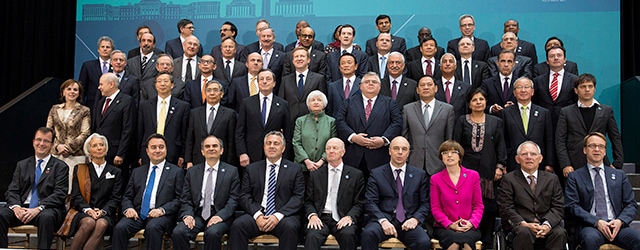Central bank governors face the tough task of stimulating growth with monetary policy, which seems to have reached a natural limit. Only fiscal policy can set the stage for long-term expansion.

Nearly 10 years have passed since the 20072008 financial crisis, and the world seems to have gotten over the worst recession since the Great Depression. Stock market indexes have set new peaks, real estate prices have bounced back, the US economy is picking up, and the Federal Reserve is talking about raising interest rates again. Most emerging countries are back in the saddle after having suffered from a sharp decline in commodity prices. World economic growth is seen expanding slightly above 3%, with China doubling that rate this year and next.
However, all this good news has not cheered voters. The growth has not led to substantial wage increases or boosted investor confidence. Long-term growth is slow and expected to remain so. There is a consensus that the economy will never recover the strength and speed it had before the downturn. It’s the “new normal.” Get used to it, economists say. Or persuade your government to do something about it.

“There is a global recession mood,” says José Antonio Ocampo, a professor of economics at Columbia University. “In industrial economies there is a mix of very low growth with a tendency to deflation, a problematic mix—even more problematic than the famous stagflation of the 1970s.” He sees China growing less than expected and emerging countries with unclear prospects.
Over the past 10 years, governments delegated to central banks the task of resuscitating aggregate demand. Populist political movements across the globe—the Brexiteers in Great Britain, the National Front in France, the Five Star Movement in Italy and supporters of both Bernie Sanders and Donald Trump in the US—are questioning more and more the benefits of international trade and immigration.
Economists are calling for action. This month thousands of delegates gather in Washington for the annual meetings of the World Bank and the International Monetary Fund, but will it lead to anything? “We all know what they do,” says Charles Wyplosz, director of the International Centre for Monetary and Banking Studies in Geneva. “[They make] wonderful statements and they rush home and do nothing.” The risk, he explains, is that industrialized countries will end up like Japan—a rich economy that has been unable to grow for more than 20 years. “This is happening in the eurozone and in a subdued way also in the US,” says Wyplosz. “It is about time for governments to get out of hibernation and do something about the world economy.”

Europe is the sick man, especially after the June Brexit vote. “Europe remains the world’s weakest economic spot,” says Marcel Fratzscher, president of economic think tank DIW Berlin. “The European crisis is far from over, and many new risks loom—from the fallout of Brexit to a full-blown Italian banking crisis.” He also says the current stagnation isn’t inescapable: “It is likely that growth in industrialized countries will continue to disappoint, but that is a result of insufficient and misguided policy action, not a law of nature.”
Tears of unconventional monetary policies and quantitative easing now risk another crisis. “There is a financial bubble due to the high liquidity on the market,” says Dominick Salvatore, professor of economics at Fordham University in New York. Although impossible to predict, funds could be hastily repatriated to the US if and when the Federal Reserve hikes short-term rates.Some observers believe monetary policy has reached its limit and is unable to support economic growth any further. Others say central banks should add to their toolboxes and become more effective. No one thinks, though, that it is entirely up to the monetary policy architects—as opposed to the fiscal policy architects—to boost long-term output.
Investors are disappointed by low returns, but those returns are the result of low economic growth. “Stock markets can go up because of high earnings or because of evaluations,” says Eric Lascelles, chief economist at RBC Global Asset Management in Toronto. “My suspicion is that earnings growth will look like economic growth—that is, fairly slow. They will limit the speed of the stock market.” Likewise, he says, on the bond market side, “there is a laundry list of reasons why interest rates are low, but a nontrivial fraction of that is because economic growth is slow.”
Although there is consensus that low growth remains the main problem, opinions diverge on solutions. According to John Cochrane, a senior fellow at the Hoover Institution at Stanford, there are three possible explanations for the current lack of growth. His own theory is that regulations have clogged the arteries of commerce: “Every single little market is now so full of regulation and political interference that it is difficult to get anything done anymore.” A second popular view, described in Robert Gordon’s book The Rise and Fall of American Growth is that the economy is structured well, but we’ve run out of fresh ideas, and therefore face a long-term decline in productivity growth. Yet a third view, familiar to followers of the IMF and World Bank, is that economic structure is fine and ideas are flowing, but there is not enough demand, which thus requires stimulus. That belief underpins IMF proposals for massive infrastructure investments.
None of these solutions, it must be noted, are in the purview of central bankers, however. It will take more than a few rate cuts to bring back long-term economic growth.



